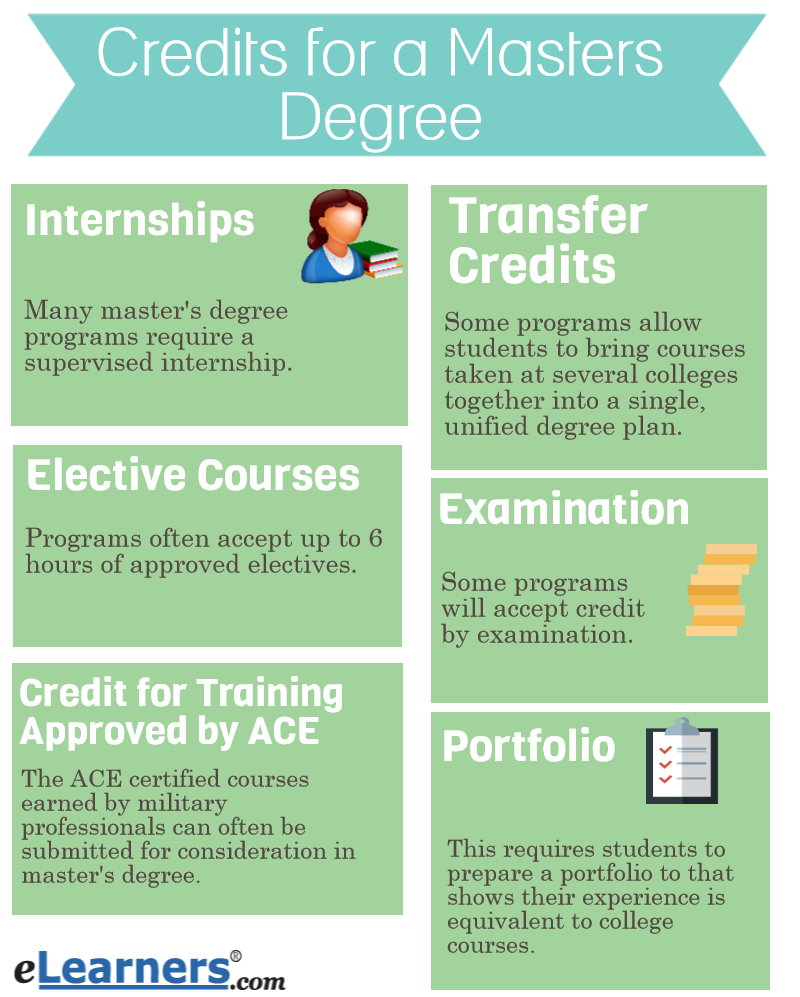Can you earn a master's degree by converting corporate training and lived experience into course credits? The answer is either "yes" or "no", depending on the person you ask, and how they go about assessing your non-traditional experiences and converting them into college credits. Here are a few different ways you can obtain credits for a masters degree.
Elective Courses: Directed Reading or Independent Study Courses
Master's degree programs, which typically require between 30 and 48 credit hours of graduate-level college credit, often allow up to six hours of approved electives. You may incorporate your interests and your lived experience in independent study or directed reading courses.

The hallmark of independent study courses that incorporate life experience is a heavy emphasis on research or a focus on theoretical foundations of your area of study. This is a fairly conservative approach to bringing together lived experience and college credit.
Internships for Credits
Many master's degree programs, such as those in human relations, public administration, business administration or counseling, require a supervised internship which culminates with a research paper or project. The graduate-level credit hours awarded for internships tend to vary, but range from 3 to 9 semester hours.
Transfer Credits
You may have taken graduate-level college courses at several different colleges or universities in conjunction with your job or lifelong learning goals. Some master's degree programs, particularly those in interdisciplinary studies, allow students to bring the courses together in a single, unified degree plan.
In some cases, it does not matter how or when the courses were taken as long as the credits were transcripted by an accredited institution of higher learning and the grade earned was a B- or better. Aggregating college credits in such a way that it creates a building block or large component of a degree program can significantly shorten one's time to graduation. For example, some colleges accept 12 to 15 hours of transfer credits toward a 30 or 33-hour degree.
Credit for Training Evaluated and Approved by ACE (American Council for Education)
Military professionals have to attend many schools and specialized training courses, many of which have been evaluated by ACE and deemed equivalent to graduate-level coursework. While some military schools may not award degrees, the certificates and the courses that you earn can often be submitted for consideration in master's degree programs.
You might think it is a bit odd to award credit for military training until you looks at the syllabi, instructional materials, and assessments of certain courses, particularly those in international relations, leadership, project management and organizational behavior. Then you may come to realize that they are identical to those taught on college campuses. In some cases, the military courses are more rigorous because they involve frequent evaluation and assessment, and the instructors may be world renowned experts in the field.
Credit for Corporate, Organizational, or Military Training
Training that is equivalent to graduate-level courses offered by colleges may not have been evaluated by ACE, but instead, has been examined by a committee of faculty members at the college that is awarding credit. In these cases, students are required to submit course descriptions and syllabi in addition to transcripts.
Credit by Examination
Some master's degree programs will accept credit by examination. There are usually limits to the number of hours that one can earn, and they may incorporate or touch on areas of one's professional life, such as accounting. For example, some colleges award credit toward an MBA degree to students who participate in exam preparation, which involves studying for standardized tests such as the CPA.
Credit for Portfolio
Occasionally, an accredited college or university will advertise that they award college credit for life experience. This requires you to prepare a portfolio and to demonstrate that your work and experience were equivalent in outcome to college courses. While the credit for life experience is acceptable in some circles on the undergraduate level, it is almost never acceptable in graduate programs. Prospective students with years of experience often wonder why their self-directed readings or work in a profession is not equivalent to a degree.
